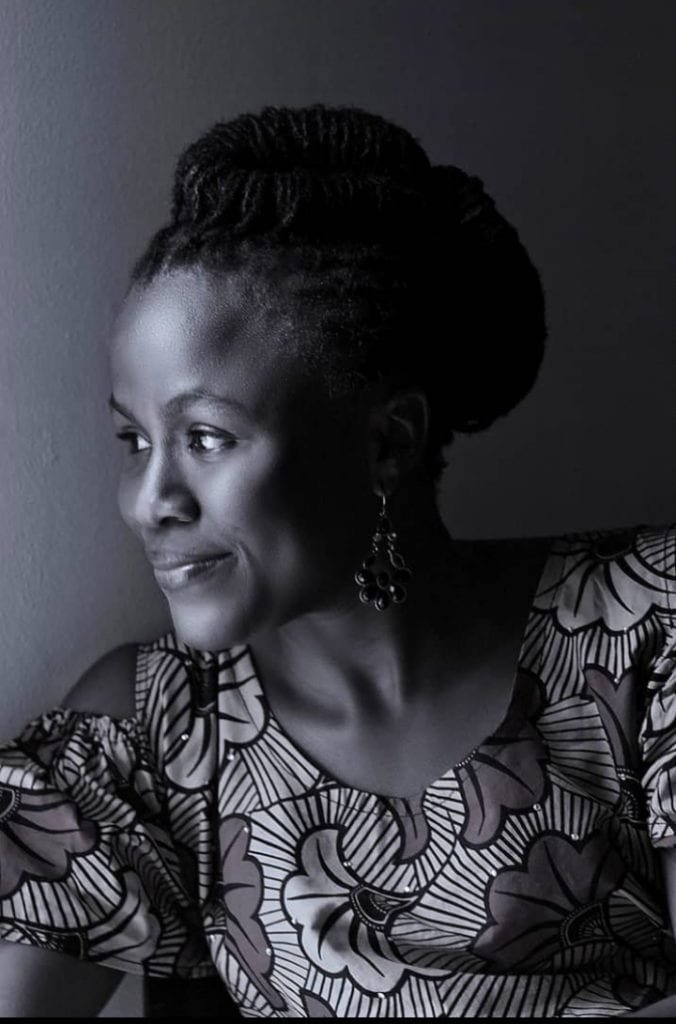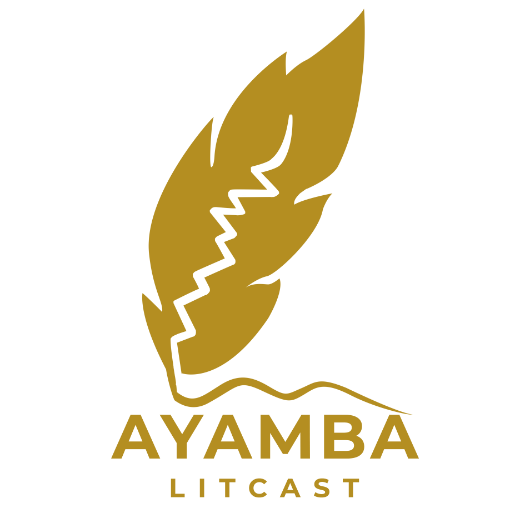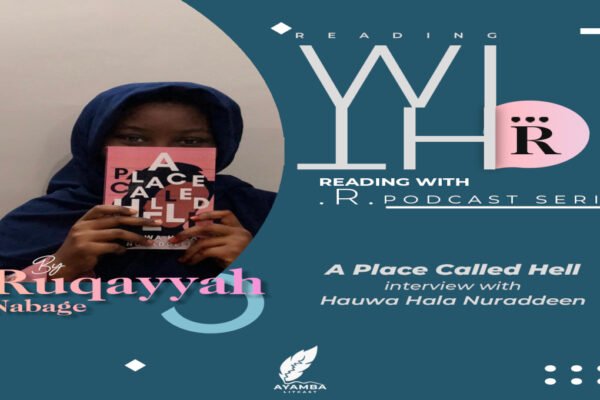This interview was conducted in June 2020

“The language of words is the only thing that has worked for me.“
Temitayo Olofinlua
Ayamba: Hello, Temitayo. Thank you for making out time for this interview.
Temitayo: Hello. Good morning, Ibrahim. Thank you for having me.
Ayamba: You won the 2019 edition of Mrs. Paula Chinwe Okafor Prize for Creative Non-Fiction. Tell us about it and the winning piece, Gathering Myself Together.
Temitayo: I had started writing a piece about my experiences as a mother especially during childbirth. I wanted to write more about the challenges and responsibilities than just the joys of motherhood. When the call for entries was announced, it felt perfect for me. So I sent the work out to two friends— JV and Tega. Their feedback helped me knock the piece into a better shape. I am grateful to them.
I’d been away from writing for a long time. Winning the prize was a needful validation.
Ayamba: Interesting. So you would say these awards and recognitions are relevant for writers?
Temitayo: It means a lot. It means your voice is being heard.
There are times I entered for prizes and didn’t win. For me, it just means the judges didn’t connect with what I’d written. My spirit may be dampened but I quickly move on.
The prize money is good. As a writer, every dollar or naira you make from your craft is a morale booster. However, more than the money, it’s also about reaching more people. Every prize is an open door to the world of your writing.
Ayamba: I couldn’t agree more. What’s your writing process? How has that been affected by the Covid-19 pandemic?
Temitayo: When I want to write on a theme or an issue, for months, sometimes for years, it lives in my head, and I have conversations with it. I also do my research and create a folder where I dump relevant information. When I start writing, I block off anything that is distracting. I don’t criticize myself too much when I’m doing a first draft, no matter how horrid it looks. Afterwards, I go back to it with more ‘critical eyes’.
However, it’s been hard to do so being a mother to two very active boys. Even when someone takes them off me, finding focus is difficult. My mind just wanders about.
Once upon a time, there was school and I could get eight straight hours and work. Now I have to work around them amidst their play and noise. Some mornings, I lock myself away for a couple of hours. And, if I tell you that means being creatively productive, it’s not true. This is coupled with the burden of Covid-19. To be honest, this is sometimes hard to bear. But I’ve learned to survive.
In the early days of the pandemic, I would wake up at night, startled. I couldn’t do anything in the first two months. I had to pull myself away from too much Covid-19 information. That was quite helpful.
Right now, I’m in the place where I’m learning to fit my creative process into everything around me.
Ayamba: I can imagine. Is there something you are working on? Or do you belong to the class of people who prefer to let time fully grow a situation before engaging it?
Temitayo: I’m working on a ghost-writing project. But I have a couple of story ideas – some are Covid-19 related, some are not. I’m tucking them away into different folders. After I’m done with the project, I’d to get back to writing my thesis, reading as many books as I can, and possibly writing reviews.
Ayamba: Great. You’re a writer and an editor. You’re also doing your PhD. Would you say the pandemic has afforded you time to be more productive?
Temitayo: Not necessarily, you know. Being a writer, an editor, and an academic is not just a passing phase but something we have to live with for a long time. I’m learning to adapt.
Ayamba: How about to-dos? How many piled up things – books, magazines, movies, music, and other soul foods – have you been able to tick off in these times?
Temitayo: Every day, I try to get rid of all the tabs opened on my laptop. I think that’s an achievement.
For books, if it’s not an academic book or a book I’m supposed to write a review of, it’s been difficult carving out the time to do any pleasurable reading. The books on the shelf can wait. I will read them when I find the time.
Ayamba: Now there’s seemingly an ideological divide between old and new writers. How would you describe yourself and for the good of literature in Nigeria, what kind of literary industry would you like to see?
Temitayo: Old and new writers? First, I don’t know where I fall to o. I don’t belong to that cult of writers who have authored books. In any case, I’m not an old writer or a new one. I’m just a writer.
There’s an Eldorado of publishing; of writers getting paid for their work; the joy of being read. Still, I understand how hard it is to be a publisher in Nigeria. I’ve been there before when I ran The Bookaholic Blog with my friend, Isabella Akinseye. Kudos to everyone in the literary space in Nigeria, whether they’re publishing, organising readings, doing book reviews, or selling books online without any pat on their back. It is a labour of love. We have to face this reality even as we hope and work towards the ideal.
Ayamba: Those are wise words. So, what are you more of, a writer or an editor?
Temitayo: I’m more of an editor these days. I don’t have the luxury to commit to my writing as much as I would love to. While it is sad, I have to make do with what I have.
Ayamba: Editors are important, so that’s fine. Now, if you weren’t a writer/editor/academic, what would Temitayo Olofinlua be into right now?
Temitayo: Trust me; I don’t know what I’d be. I’m one of those people in this world, ehn, who have only one talent. This is coming from someone who has tried a couple of things: baking, sewing, coding. The language of words is the only thing that has worked for me.
Ayamba: If you could give one piece of advice to a young person who is starting out as a writer, what would it be?
Temitayo: When I finished from Ife in 2007 and was waiting for NYSC, I applied for an internship position at Kachifo and was invited for an interview. My interviewer was Igoni Barret. We talked about writing. I told him about my editing of Socioscope, a journalism board at University of Ife.
That was all I needed to get the job. I started work, took part in editorial meetings, and saw how publishing works. We were given assignments to reach out to some writers and all that. Nothing was impossible, I thought. Just figure out how to get it done. And that was what I was doing.
The internet was really good at the office so I read things I would normally not have access to. I read the magazines and also the books on the shelf.
So, my advice is: Never wait for anyone’s permission to do what you really want to do. Don’t wait for validation. As long as you’re not hurting or harming anyone, just do it, and keep doing it. It will be hard but the lines will fall for you in pleasant places.
Ayamba: I’m sure our readers will find this piece of advice useful. Personally, I do. It’s been an interesting and insightful time with you, Temitayo.
Temitayo: Thank you so much Ibrahim. It was nice speaking with you.
Temitayo Olofinlua is a writer and editor. Her essays have won several awards including the Peter Drucker Challenge, 2012 and 2014; and Mrs Paula Chinwe Okafor Prize for Creative Non-Fiction, 2019. She is currently a PhD student at the University of Ibadan.


